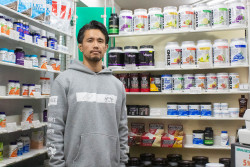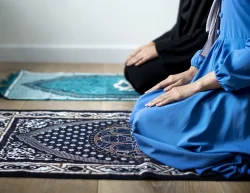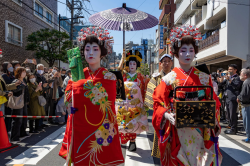
October 10, 2011
Amnesty International Japan
AI celebrates 50 years of fighting for human rights and dignity
By Metropolis
Originally published on metropolis.co.jp on October 2011

Amnesty International, one of the largest non-governmental organizations in the world, has been monitoring and fighting human rights abuses since 1961. To celebrate its 50th anniversary, AI Japan will be hosting a solo concert by famous violinist Atsuko Tenma on October 12. Prize-winning veteran Tenma took up the instrument at six years old, and is admired for her strong stage presence and prolific and high-selling releases. Famously, she plays with a late Stradivarius violin and employs the bow used by legendary master Eugene Ysaye.
For AIJ’s newly appointed executive director, Hideki Wakabayashi (pictured), this milestone is a chance both to look back at what has been achieved so far and to look forward to the challenges lying ahead. “One of our top priorities,” Wakabayashi says, “is to expand the concept of human rights. The death penalty and discrimination against minorities are probably the two main things that come to mind, but we can’t forget other issues. So, in accordance with AI’s international Demand Dignity campaign, we are concentrating on problems such as women’s reproductive rights, gender inequality, and temporary labor.
“Think about karoshi (death by overwork), or the huge discrepancy between regular workers on one side and temporary or part-time workers on the other. We believe that these too are human rights violations that need to be addressed.”

Wakabayashi’s unique background is probably one of the reasons for his particular interest in social and economic problems: after graduating from Waseda University he first joined Yamaha Corporation, where he became assistant secretary of the company’s labor union, before going on to work for the Japanese Electrical Electronic and Information Union (Denki Rengo). Then, after being elected to the Upper House of the National Diet in 2001 as a member of the Democratic Party of Japan, he became the shadow cabinet’s Senior Vice Minister of Finance.
Wakabayashi insists that his past political activity with the DPJ is not going to affect his work with AIJ. “Amnesty is an independent organization with no political affiliations. For example, even though we don’t have a lot of resources, we don’t accept any kind of financial aid from the government.”
Unfortunately, Japan is one of the weak links in AI’s three million-strong international organization. Although representing the tenth most populated country in the world, the AIJ’s members number a paltry 6,500. Part of the reason for this is that NGOs in Japan don’t have a long history. Most were founded in the 1980s or later, and many people still don’t know what they really are or what they do. Neither do they have much of a conception of Amnesty outside its famed struggle against the death penalty. But Wakabayashi aims to broaden the issues under examination. “The death penalty is a symbol of our struggle but it is also very divisive,” he explains. “This doesn’t mean we won’t keep fighting toward its abolition; it’s just that we probably need to tackle some more intermediate issues first.”
Domestically, AIJ is currently working for the establishment of a Human Rights Commission that, ideally, would be independent from the Ministry of Justice. Another important issue is the taping of interrogations to avoid police abuse and miscarriages of justice. “My hope,” Wakabayashi says, “is that through these little steps people will eventually understand what human rights are and why they are so important. Hopefully more people in the future will realize that the only way in which we can affect a change is through direct participation.”
AIJ will also continue to act as a watchdog on international issues. Among the events for the half-centenary celebrations, AIJ has organized a national “speech tour” featuring two activists from Nigeria and Myanmar. The tour will touch nine cities nationwide and will take place in Tokyo twice: on October 29 and November 6.
- Atsuko Tenma’s solo violin concert. Oct 12, 6:30pm, ¥4,500 (¥4,000 advance). Tsuda Hall, 1-18-24 Sendagaya, Shibuya-ku. Tel. 03-3402-1851. Nearest stn: Sendagaya or Kokuritsu Kyogijo.
- Speech tour in Tokyo. Oct 29 & Nov 6. Tel: 03-3518-6777.
- Email: camp@amnesty.or.jp.







